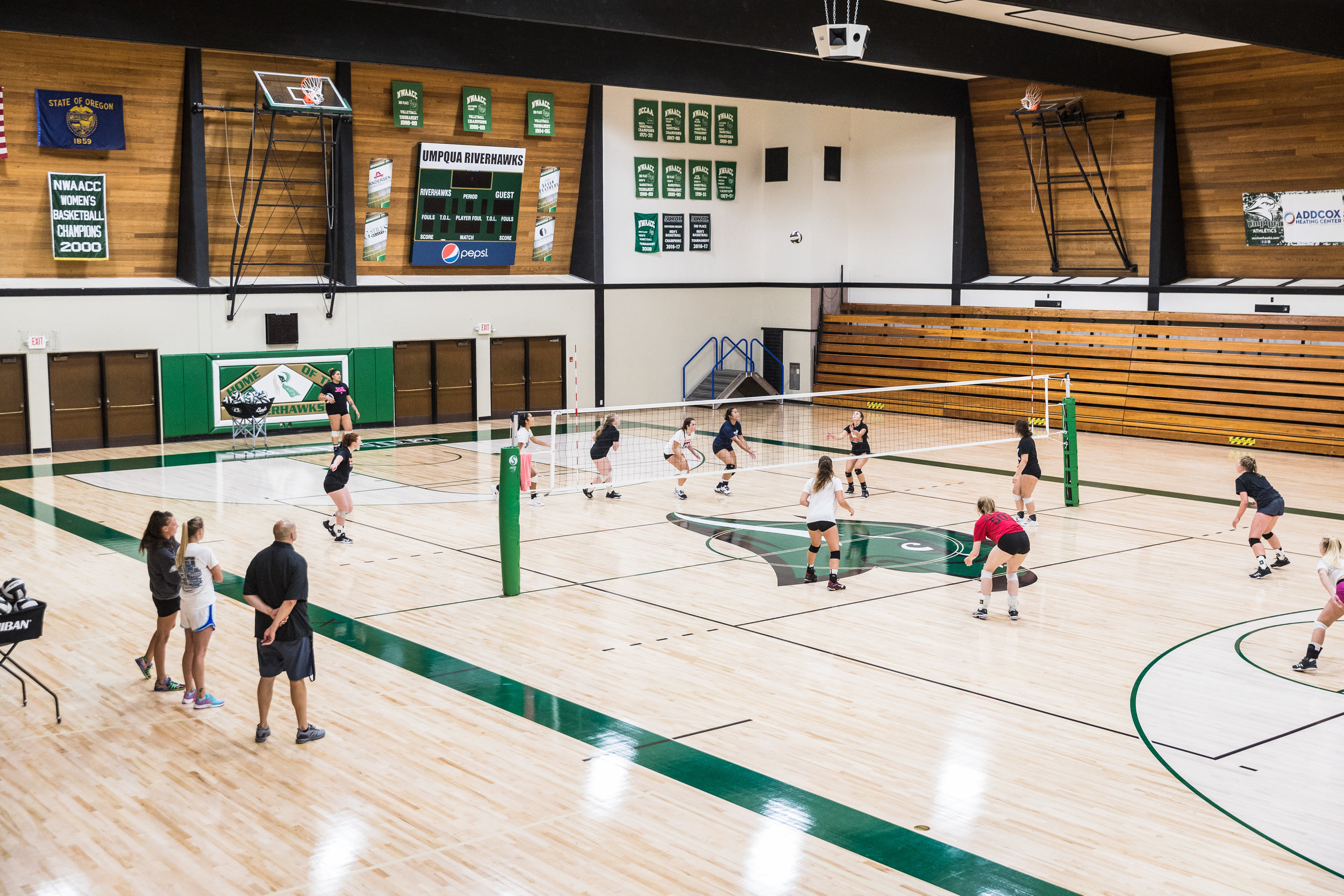Legends of the Umpqua: Thurman Bell

From Gridiron to Green
Story by Dick Baltus Photos by Robin Loznak
It has been three years since Thurman Bell retired from a distinguished 50-year career coaching football, 45 of which were spent at Roseburg High School. Three years, a whole lot of rounds of golf and far too much rock work.
“I need to get another job so I can get some rest,” Bell says from the comfort of his beautiful home overlooking Melrose.
From his seat behind the desk in his home office, Bell is surrounded by walls and shelves decorated with just about as much memorabilia as one would expect of an Oregon football legend who coached a few thousand players, took nine teams to state championship games, won four of them, and last year was inducted into the Oregon Sports Hall of Fame.
Those are all reminders of past glory, but Bell’s life is different these days. On the way up the long driveway to the home he shares with his wife, Jenny, it’s immediately clear Bell is doing more than just playing golf in his retirement years.
The three flags planted in the field below his home, at varying lengths from the tee box situated at the edge of his back yard, make it clear Bell has been doing some practicing as well. With a handicap that fluctuates between seven and 11, it’s also clear the practice is paying off.
“Now that I have the time to do it, I’ve become obsessed with golf,” he says.
But retirement isn’t all fun and games. It also appears that Bell is obsessed with rock walls and stairs, since they are a dominant feature around his home. He prepped the dirt and placed all the rocks himself, including the several hundred that comprise a retaining wall that stretches a couple dozen feet along the turnaround driveway at the entrance to his home and looks tall enough to hold off a tsunami.
After 50 years patrolling sidelines and dugouts (he coached baseball for a while, too), the coach still has a little energy to burn.
Bell has only attended three games since retiring, but it’s not because he doesn’t miss the game and coaching it. “I’ve always felt that anyone who has a job for a lot of years, then quits it and says he’s glad he’s done, shouldn’t have been doing that job in the first place,” Bell says. “My career wasn’t a job. I played games my whole life and got to make a living out of it. But for some reason it has been difficult emotionally for me to go back and watch.”
As a youth growing up in Fresno, Calif., Bell had hoped to make a living playing games professionally. Out of high school, he actually signed a contract for $27,500 to play professional baseball.
“That was big money then, but I gave it back,” he says. “I wanted to go to college.”
So Bell headed to Oregon State to play baseball and football. He played the latter for two legendary coaches — first Tommy Prothro, then Dee Andros. Under Prothro, he was a wide receiver, mainly a blocking one playing behind All-American Verne Burke, the favorite target of Heisman Trophy winner Terry Baker.
“AFTER I INTERVIEWED AT ROSEBURG, I GOT A CALL ASKING HOW LONG IT WOULD TAKE ME TO MAKE MY DECISION IF I WAS OFFERED THE JOB. I SAID, ‘ABOUT 10 SECONDS.’ I GUESS THAT WAS THE RIGHT ANSWER.” —Thurman Bell
When Andros took over as head coach for Bell’s senior year, he switched to defensive back, where he wound up being named Most Improved Player.
Bell wound up signing another pro contract, this time to play in the Canadian Football League. But he let that one go, too, after he was injured playing baseball the next spring.
Bell’s coaching career started at Lebanon High, where he did his student teaching, assisted with the football and basketball teams and was head coach for varsity baseball.
After three years there, he left for Grants Pass to be head baseball coach and defensive coordinator. Two years later, at age 27, he got the job in Roseburg, becoming the youngest head high school football coach in Oregon.
“I was kind of shocked when I got the job,” he remembers. “The two other candidates were the 2A (classification) and 3A coaches of the year, and I was just an assistant. After I interviewed, I got a call asking how long it would take me to make my decision if I was offered the job. I said, ‘About 10 seconds.’ I guess that was the right answer because apparently the other guys said they’d need more time.”
In Bell’s first season Roseburg, which had only won one of its nine games the prior year, did a compete turnaround—in a manner of speaking.
“My first team was one and eight too, so I came in and immediately turned the program around 360 degrees,” he says, laughing.
Things would get better soon and for a long, long time.
Bell says he ascribed to an old-school, hard knocks style of football, and there are coaches all over Oregon who can attest to that. One of those is Gary Stautz, who played defense under Bell at Grants Pass High, then coached against him later as a long-time assistant and then head coach at Gresham High, east of Portland.
“He always brought tremendous enthusiasm, intensity and discipline,” Stautz remembers. “When you played for him, he could really get after you, but he was quick to pat you on the back as well.”
Stautz, who stood across the sideline from Bell once as head coach and other times as an assistant, says “His teams were always really good. They were always well-prepared, and you knew they weren’t going to beat themselves.”
Over the years, Bell was a positive role model for a lot of young football players and coaches, including, he estimates, 24 who left Roseburg and became head coaches elsewhere. One of his former quarterbacks, Troy Calhoun, is the current head football coach at the Air Force Academy.
But Bell deflects much of the credit for the long-term success of his program to other role models, namely his players’ parents.
“We’ve had tremendous athletes and assistant coaches, but we owed a lot of our success to the strength of our families,” he says. “We’ve had a lot of special kids and a lot of special and supportive parents. When I think back on my career, my fondest memories are of my kids, my coaches and the parental and community support I enjoyed for so many years.”
FROM THE ARCHIVES
Ever wonder how Roseburg High’s Finlay Field got its name? Read on and wonder no more.
Story by Josh Gaunt
Anyone with an interest in Roseburg High School athletics knows Finlay Field. Built in 1923 and rebuilt in 1996, the landmark stadium is home to Roseburg High’s football and track programs as well as community events and the high school’s commencement ceremony.
The field’s two grandstands seat some 5,000 people, and with temporary seating added, the facility can accommodate crowds of up to 9,000.
What isn’t as well-known is the story of the stadium’s namesake, whose legacy began more than a century ago. The youngest of 10 children, Gilbert Finlay was a talented athlete as a youth in the early 20th century. It was said he played Sunday baseball under an alias because baseball at that time was considered by some a violation of the Sabbath.
Such was Finlay’s talent on the diamond that he was reportedly offered a professional tryout by the Chicago White Sox in 1909. What happened with the tryout is lost to history. But in 1911, Finlay appeared in Roseburg with a degree from the Illinois Dental School in hand. He set up what became a successful dental practice and also got involved with sports again at Roseburg High.
Finlay volunteered as an assistant coach for the high school baseball and football teams. He also served as volunteer groundskeeper for both programs, laying out the diamond and gridiron and marking the respective fields.
He became Roseburg High’s athletic director in 1913 and held the position until 1921.
When Roseburg started a basketball program, Finlay was its first coach. His 1916-17 Indians claimed Oregon’s unofficial state championship (officially sanctioned state tournaments would not begin until 1920).
Such was the outsized impact of Finlay — he stood an estimated 5-foot-5 — that in 1925, the high school’s 2-year-old athletic stadium was rededicated as Finlay Field.
Finlay would spend nearly 50 years as a practicing dentist in Roseburg, and remained an avid high school sports fan.
His son, James Sr., was an all-state basketball star at Roseburg High and played one season of college basketball at Oregon State in 1944, after which he joined the Navy and served in World War II. He was trained as a dentist and joined his father’s practice upon his discharge in 1945.
Gilbert Finlay retired in 1960, but by that time James Sr. had two of Finlay’s grandsons — James Jr. and Dave — ready to step in.
The family’s patriarch died in 1980, but nearly four decades later, his name still adorns the venerable high school stadium.
A footnote, though: Dave Finlay retired in 2011, ending a century of Finlay family dentistry in Roseburg. When Dave closed the office for the last time, it was located in Roseburg’s Professional Center. That used to be the Medical Arts Building, which is what it was called when Gilbert Finlay moved his practice to the same location in 1929.









